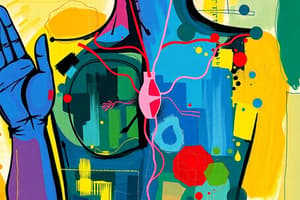Podcast
Questions and Answers
A ______is an intense, irrational fear or anxiety about an object, place, or situation
A ______is an intense, irrational fear or anxiety about an object, place, or situation
phobia
Children in their ______ years develop language skills, learn to play cooperatively in groups, and begin to learn right from wrong.
Children in their ______ years develop language skills, learn to play cooperatively in groups, and begin to learn right from wrong.
preschool
Flashcards
Hospice
Hospice
Specialized care focusing on dignity and comfort for dying individuals.
Postmortem care
Postmortem care
Care given to a resident after they have died, including placing drainage pads.
Toddler development
Toddler development
Stage where children learn to speak and gain control of bodily functions (ages 1-3).
Advance directives
Advance directives
Signup and view all the flashcards
Palliative care
Palliative care
Signup and view all the flashcards
Last sense to leave
Last sense to leave
Signup and view all the flashcards
Sign of imminent death
Sign of imminent death
Signup and view all the flashcards
School-age children
School-age children
Signup and view all the flashcards
Phobia
Phobia
Signup and view all the flashcards
Clinical depression symptoms
Clinical depression symptoms
Signup and view all the flashcards
Cognitive development (6-10 years)
Cognitive development (6-10 years)
Signup and view all the flashcards
Mental health support
Mental health support
Signup and view all the flashcards
Claustrophobia
Claustrophobia
Signup and view all the flashcards
Schizophrenia
Schizophrenia
Signup and view all the flashcards
Reporting abuse
Reporting abuse
Signup and view all the flashcards
Comfort to dying residents
Comfort to dying residents
Signup and view all the flashcards
Emotional support for dying
Emotional support for dying
Signup and view all the flashcards
Dying Person's Bill of Rights
Dying Person's Bill of Rights
Signup and view all the flashcards
Infants physical development
Infants physical development
Signup and view all the flashcards
Holistic care
Holistic care
Signup and view all the flashcards
Activity of Daily Living (ADLs)
Activity of Daily Living (ADLs)
Signup and view all the flashcards
Promoting independence
Promoting independence
Signup and view all the flashcards
Responding to religious beliefs
Responding to religious beliefs
Signup and view all the flashcards
Privacy in sexual situations
Privacy in sexual situations
Signup and view all the flashcards
Regular activity benefits
Regular activity benefits
Signup and view all the flashcards
Family involvement in care
Family involvement in care
Signup and view all the flashcards
Normal aging signs
Normal aging signs
Signup and view all the flashcards
Developmental disabilities
Developmental disabilities
Signup and view all the flashcards
Early childhood language skills
Early childhood language skills
Signup and view all the flashcards
Study Notes
CNA Chapter 3 Exam (GRADED A)
- Holistic care focuses on the person's physical, mental, and social well-being
- A physical need is an example of something like the need for water
- A psychosocial need is an example like the need for acceptance
- A nursing assistant can promote resident independence by allowing a resident to do a task by himself no matter how long it takes
- Activities of daily living (ADLs) include reading, taking part in facility activities, attending a worship service, and brushing teeth
- If a nursing assistant notices abusive behavior from a family member, report it to the nurse immediately
- When caring for a dying resident, observe body language and ensure the resident is comfortable
- Hospice care involves placing drainage pads where needed, removing tubes from the dead resident, and placing drainage pads where needed to help determine the cause of death
- The last sense to leave the body is touch
- Decreasing blood pressure is a sign of approaching death.
- Children in their toddler years develop language skills.
Studying That Suits You
Use AI to generate personalized quizzes and flashcards to suit your learning preferences.




